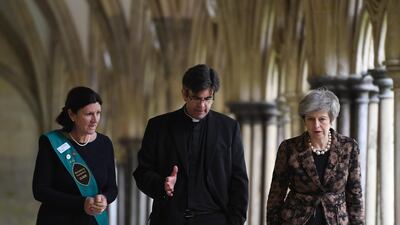Prime Minister Theresa May told residents of Salisbury on Monday that the government was committed to the city’s recovery from the impact of a state-sponsored poison attack that was “devastating and reckless".
Sergei Skripal and his daughter Yulia were poisoned by a nerve agent on March 4 2018 at their home but survived. Local woman Dawn Sturgess died a number of months later after inadvertently coming into contact with remnants of the Novichok. Salisbury was declared free of the nerve agent last Friday.
The son of Ms Sturgess has called on Russian leader Vladimir Putin to hand over the suspects.
"Putin needs to give up these killers so my family can finally get justice. He needs to show he's capable of showing some humanity to our family. I would ask him to imagine how he would feel if he was in my shoes," he told the Sunday Mirror.
“We’ve lost our mum and all we want is justice. He should be able to understand that.”One year on from the Novichok poisoning that catapulted the British city of Salisbury into international headlines, Russia’s embassy in London has accused the UK government of failing to provide solid evidence that Moscow was behind the attack on a former double agent.
At least three serving Russian intelligence officers have been identified as allegedly behind the attempted assassination. Two of those believed to be involved claimed they were only in Salisbury to visit its world famous cathedral in a widely-derided interview with state-owned channel RT.
“The British government has yet to provide an official explanation of what happened, supported by proof. In violation of international law, the UK has isolated the Skripals and is destroying evidence, in order to make it impossible to verify the British version in the future,” Russia’s London embassy said in a statement.
“For the past twelve months, as the investigation was going on in a secret mode, the attention of the British public was deflected by various leaks controlled by secret services. The Foreign Office has repeatedly refused to confirm or deny them in contacts with the embassy.”
The statement accused the British media of an “unprecedented, and carefully scheduled, smear campaign,” against the Russia’s embassy in London and its ambassador. Britain was urged to “end to the blatant anti-Russian campaign in the media” and “lift the veil of secrecy,” over its investigations.
As a result of the dispute, UK-Russian relations have taken a substantial hit amid accusations and counter claims over the true circumstances. In May 2018 Britain expelled 23 and Russian diplomats in London it said were “undeclared intelligence officers”.

